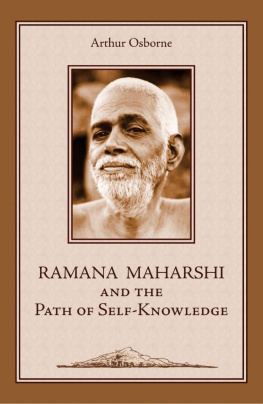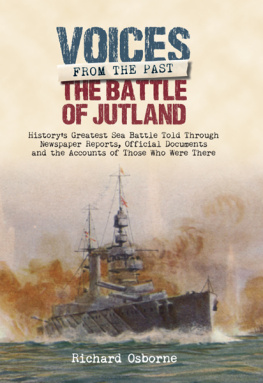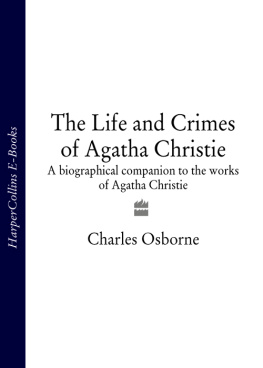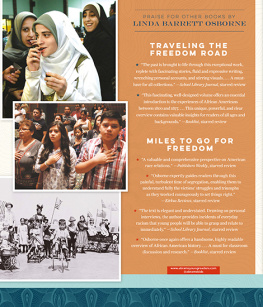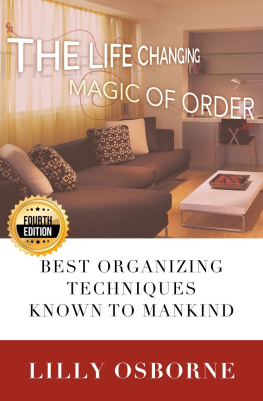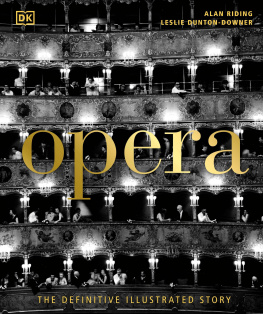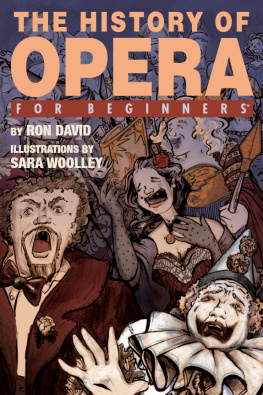Preface
Dr Johnson, in the eighteenth century, took the idiosyncratic view that opera was an exotic and irrational entertainment. Opera was certainly that at its inception more than a hundred years before Samuel Johnsons birth, when a group of noblemen in Florence, intent on reviving the drama of ancient Greece, encouraged into existence a new theatrical art form which combined words and music. In the very first opera, Dafne, composed by Jacopo Peri in 1597, although the entire text was sung the words took precedence over the music, not by intention but because the music for the most part followed the inflections of speech, only occasionally broadening into something approaching melody.
With the stage works of Claudio Monteverdi, the first great composer of opera, the division between this heightened speech (recitative) and the quasi-melodic sections of the drama (arioso) became more pronounced. Italian opera developed quickly and was soon being staged by the imperial court in Vienna as well as at smaller princely courts throughout the German-speaking countries. In due course it spread to France and eventually, after the Restoration, to London, where the first real English opera, Purcells Dido and Aeneas, was staged in 1689. Early in the eighteenth century, Italian opera established itself in London, and what had begun as an entertainment for aristocratic intellectuals gradually became popular with a wider public.
In Italy opera soon became the most popular form of theatre, remaining so throughout the nineteenth century and well into the twentieth. In other European countries, especially Germany and Austria, it often shared the stages of civic theatres with straight plays. Now, at the beginning of the twenty-first century, there are in the United States of America and Canada more than 140 professional companies staging regular (although, outside the principal cities, not necessarily lengthy) annual seasons of opera, while in Britain there are several well-established companies, ranging from the Royal Opera, English National Opera, Glyndebourne Festival Opera, Opera North, Scottish Opera and Welsh National Opera to such smaller-scale companies as English Touring Opera, City of Birmingham Touring Opera and British Youth Opera.
The staples of the operatic diet today are the major works of five great composers Mozart, Verdi, Wagner, Puccini and Strauss (and one could add Beethoven here for his only opera, Fidelio, a masterpiece that I consider hors concours) as well as operas by Handel, Rossini, Donizetti, Bellini, Bizet, Massenet, Tchaikovsky, Mussorgsky and Britten, and selected works of a large number of other composers, among them Berlioz, Gluck, Gounod, Humperdinck, Janek, Leoncavallo, Mascagni, Offenbach, Saint-Sans, Smetana and Weber (in tactful alphabetical order).
I have included nearly two hundred operas in this guide all of those that are regularly performed today, as well as a good many that one encounters in the opera house less frequently. I have placed each opera in context in its composers development, and have also discussed the circumstances surrounding its composition and first production. I have followed this with a brief synopsis of the plot, and also my personal assessment of the music, paying particular attention to the most important and significant arias, duets and ensembles.
C.O.
The Opera Lovers Companion
The Opera Lovers Companion
CHARLES OSBORNE

Copyright 2004 by Charles Osborne
All rights reserved. This book may not be reproduced in whole or in part, in any form (beyond that copying permitted by Sections 107 and 108 of the U.S. Copyright Law and except by reviewers for the public press), without written permission from the publishers.
For information about this and other Yale University Press
publications, please contact:
U.S. Office: sales.press@yale.edu yalebooks.com
Europe Office: sales@yaleup.co.uk www.yaleup.co.uk
Set in Minion by Alliance Interactive Technology, Pondicherry, India
Printed in the United States of America
ISBN 0300104405
Library of Congress Control Number 2004107445
A catalogue record for this book is available from the British Library
The paper in this book meets the guidelines for permanence and durablility of the Committee on Production Guidelines for Book Longevity of the Council on Library Resources.
2 4 6 8 10 9 7 5 3 1
For Ken Thomson
Contents
DANIEL-FRANOIS-ESPRIT AUBER
(b. Caen, 1782 d. Paris, 1871)
Fra Diavolo, ou Lhtellerie de Terracine
(Fra Diavolo, or The Inn of Terracina)
opra comique in three acts (approximate length: 3 hours)
Fra Diavolo, a bandit chief tenor
Lord Cockburn, an English traveller tenor
Lady Pamela, his wife mezzo-soprano
Lorenzo, an officer tenor
Matheo, an innkeeper bass
Zerline, his daughter soprano
Giacomo, a bandit bass
Beppo, a bandit tenor
LIBRETTO BY EUGNE SCRIBE; TIME: 1830; PLACE: THE COUNTRYSIDE NEAR ROME; FIRST PERFORMED AT THE OPRA-COMIQUE, PARIS, 28 JANUARY 1830
The composer of forty-eight operas, most of them in a light vein and written in collaboration with the librettist Eugne Scribe, Auber was one of the leading figures in the development of nineteenth-century French opera. His Gustav III (1833) is the work whose libretto Verdi made use of for Un ballo in maschera twenty-six years later. Le Domino noir (The Black Domino, 1837) has one of Aubers most elegant scores, and a performance in Brussels in 1830 of La Muette de Portici (The Mute Girl of Portici) is said to have sparked off the Belgian revolution.
Fra Diavolo, the most successful of Aubers operas when it was first staged in 1830,had by 1907 been performed more than nine hundred times at the Opra-Comique in Paris. Alessandro Bonci and, later, Tito Schipa were famous Diavolos. The opera is still to be encountered, especially in France, Germany and Italy, and in 1969, making his San Francisco debut, the Swedish tenor Nicolai Gedda was a greatly admired Diavolo. In 1933 those great comedians Stan Laurel and Oliver Hardy starred in Fra Diavolo, a highly amusing movie burlesque of the opera, with its principal numbers retained. Laurel and Hardy played Stanlio and Olio, two wandering vagrants who become accomplices of Diavolo (performed by Dennis King, a popular American operetta tenor of the day). The film turns up occasionally on TV and still retains its ability to entertain.
Act I. A tavern. The bandit Fra Diavolo, calling himself the Marquis of San Marco, is involved in a plan to steal money and jewels from two English travellers, Lord and Lady Cockburn. (Diavolo was based by Scribe on a real-life bandit, Michele Pezze, who flourished in southern Italy around 1810.) At the inn where the English couple are staying, in the vicinity of Terracina, Diavolo contrives to remove Lady Pamelas diamond necklace while she is wearing it. A sub-plot involves Zerline, the innkeepers daughter. She is in love with Lorenzo, a poor officer in the Roman dragoons, but is being forced by her father to marry Francesco, a rich farmer.
Act II. Zerlines bedroom. Diavolo, still posing as the Marquis, enters Zerlines room, hoping to gain access from it to the rooms occupied by the English couple, and is joined by his fellow bandits, Beppo and Giacomo. When his presence is discovered he pretends to have been summoned by Zerline to a rendezvous, thus arousing Lorenzo's jealousy.


